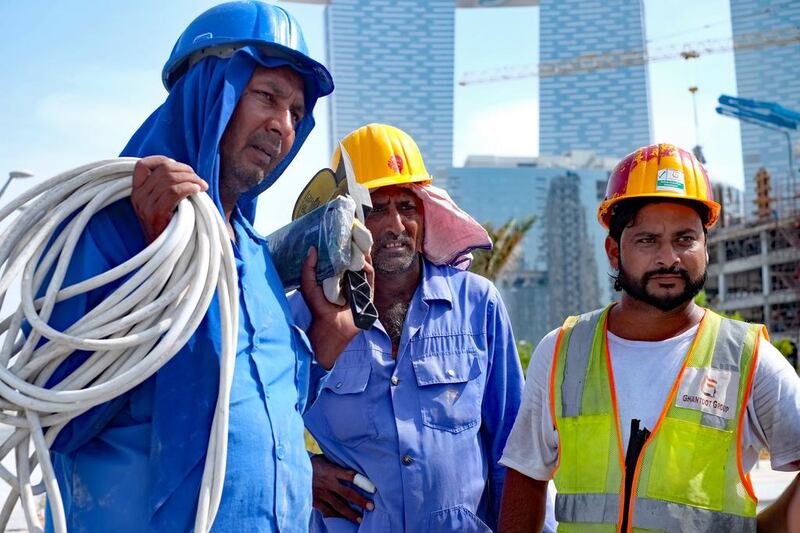ABU DHABI // Construction workers have expressed relief as the midday break kicked in ahead of one of the hottest weekends on the year.
Labourers took time out for two and a half hours yesterday as the three-month mandatory rest order came into effect.
It will ensure companies cannot ask outdoor workers, particularly labourers, to work between 12.30pm and 3pm until September 15.
It came as temperatures were forecast to hit highs of 46C in Abu Dhabi today and 80 per cent humidity, according to the NCMS weather centre.
In Dubai temperatures are also around 45C. Humidity is forecast to hit 100 per cent at night in the coming days.
The past few weeks have been a struggle, some labourers said.
Last year, the midday break coincided with the start of Ramadan, whereas this year three weeks have already passed, providing a challenge to fasting workers.
“As the temperatures was increasing everyday, we were waiting for the midday break rule to begin so we don’t have to work in the afternoon,” said Sukhwant Singh, an Indian on a site in Reem Island, with relief on his face.
“It was getting harder to work every passing day during summer, especially after 12pm, so when we had our break and went to sit in the AC room it felt really good and refreshing.”
Another Indian, Vipun Kumar, said it takes time to get used to the heat once the summer arrives.
“Once winter is over and the heat starts, it takes time to adapt to working long hours in the sun.
“It takes almost two months to get used to it and accustom our bodies to bearing the heat, but we do it every year, it is usual for us.”
Kumar said he was glad his Muslim colleagues who are fasting get a chance to work shorter days.
“We all start together at six, and the ones who are fasting leave at 12.30pm, while we work until 5.30pm with the midday break in between. It is much harder for my friends fasting so I’m happy to work longer instead of them.”
Widad Ali, a supervisor at another site, said timings are much more flexible today.
“Working hours are reduced in Ramadan and we work only for six hours. Our work in Ramadan starts from 6am and ends at 12pm daily,” said Mr Ali, who earns Dh1,400 per month.
“Ramadan fasting is a religious obligation, we are not concerned whether it falls in hotter days or colder seasons. We have to exercise it. But the flexible timings are convenient for us.”
“We don’t sleep after observing our sehri prayer. We generally venture out to the work site at 4.30am daily,” he added.
But some workers look forward the days when Ramadan forward in the year into the winter months.
“It’s scorching hot when temperatures soar up to 40C but we don’t have any option but to work. It’s difficult even during regular days,” said Zahid Zaman on one Abu Dhabi work site.
“We fast as usual and heat can’t stop us from observing fast. Due to hot weather and fasting, of course, we feel thirsty and it’s a testing time for us,” said Mr Zaman, who earns Dh1,200 a month.
Omar Zada, said his employers have also been flexible, with those fasting working between 6am and midday.
“We reach our accommodation by 1pm, perform prayers, take a rest and then prepare iftar meals for ourselves,” he added cheerfully.
newsdesk@thenational.ae






